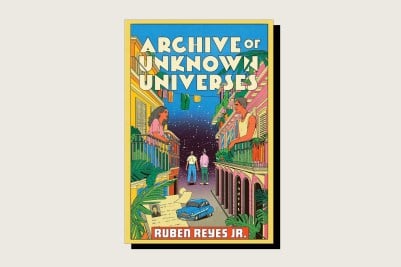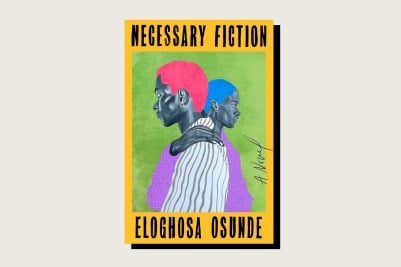This month, we’re reading about the complexities of love—particularly queer love—in environments that are hostile to it, from war-torn El Salvador to modern-day Lagos.
Archive of Unknown Universes: A Novel
Ruben Reyes Jr. (Mariner Books, 288 pp., $28, July 2025)
It is hard to imagine a story more deftly engaged with the political themes of our time than Archive of Unknown Universes. In his debut novel, Salvadoran American author Ruben Reyes Jr. sends his characters on an adventure through a quasi-multiverse to explore alternate outcomes of El Salvador’s 1972-92 civil war—a conflict that had implications for the entire Western Hemisphere.
Archive of Unknown Universes begins in 2018. Its protagonists are Ana and Luis, two Salvadoran American students at Harvard University who are dating. Despite trouble in their relationship, Luis travels with Ana to Havana, where she is due to conduct archival research on the Salvadoran Civil War. (The Cuban government aided El Salvador’s leftist rebels.) Ana is “after dignity for a tiny country, a forgotten country, a country conveniently erased from the map.” Luis has a “suspicion that the trip was a last-ditch attempt to save a relationship on the rocks.”
Although she is a diligent researcher, Ana is enamored by a fictional device known as the Defractor, which allows users to render different versions of their lives. The Defractor is experimental technology, still housed mostly in university libraries for academic use, but the “overeager American tech sector” seeks to “make it a hot consumer product, regulation-free.” Debates over the Defractor have obvious parallels to artificial intelligence. “Scrolling the internet without seeing an article about the Defractor was impossible,” Reyes Jr. writes; some people “saw the technology as a one-stop solution for all their personal problems.”
The Defractor lends the story an element of magical realism, a literary tradition with strong roots in Latin America. When Ana peeks into a Defractor at the University of Havana, she deviates from her research questions to ask whether her relationship with Luis has a future. In one Defractor-generated reality, she sees herself with another partner. Ana becomes convinced that “the mystery man, her other boyfriend, held some sort of answer” to lingering questions about her family history. (Both Ana’s and Luis’s mothers fled El Salvador during the war.)
The Defractor rips the novel’s plot in two. In the first universe—the known universe—U.S. President Ronald Reagan funnels “millions of dollars in guns, ammunition, and military training into El Salvador,” and the leftist rebels lose. In the second universe, the “Salvadoran Revolution” succeeds because the United States does not intervene. El Salvador becomes a communist success story akin to Cuba.
Reyes Jr. weaves both universes together to reveal long-buried secrets. Ana and Luis’s fraying bond is contrasted with an intense historical gay romance, condemned “no matter which way the war shifted.”
It is hard to read Archive of Unknown Universes without thinking of El Salvador’s current president, Nayib Bukele, who has fashioned himself a global right-wing icon and vociferous proponent of mass incarceration. Reyes Jr. was strategic in setting his novel before Bukele came to power in 2019. Bukele has transformed El Salvador, whitewashing authoritarian abuses with flashy tourism campaigns and social media stunts. His ascent could have disrupted the cadence of novel’s first universe.
But the fictional communist Salvadoran government and Bukele share some key traits. “Ana had read enough to know that aesthetic maintenance was the government’s shield against the world,” she reflects while visiting communist San Salvador. “The capitol was beautiful, but beauty was not justice.” Certain outcomes remain the same across all universes.—Allison Meakem
Necessary Fiction: A Novel
Eloghosa Osunde (Riverhead Books, 320 pp., $28, July 2025)
“This is kind of how we get through our lives: we tell ourselves stories so that what’s happening becomes something we can live with. Necessary fictions.” This quote by Lidia Yuknavitch is an epigraph—and a guiding tenet—in Nigerian author Eloghosa Osunde’s second novel, a feverish celebration of queer life in Lagos, a “fast city” where “shit keeps spinning.”
Like Osunde’s debut Vagabonds!, Necessary Fiction is a novel-in-stories. (The first chapter, “Good Boy,” won the Paris Review’s Plimpton Prize for fiction in 2021.) It’s structured around a series of vignettes of characters who fight to carve out spaces for themselves in Lagos’s unforgiving sprawl, crafting narratives about their lives that help them get by, even thrive, in the margins of a society that criminalizes queerness.
At times, that’s done with the universal language of money. As one character in a relationship with another man notes, “a mad whip is a great way to say, Don’t fuck with me, and here the streets need to hear that in pidgin, Yoruba, Igbo, Hausa, plus many other languages. … Me and K wear rings, but people don’t ask personal questions when they see what you’ve come out of. We bought that right to go unchallenged. It was not cheap.”
More often, though, their identities are constructed through self-questioning and, importantly, conversations with friends. Osunde’s characters like to shoot the shit, and Necessary Fiction is a love letter to the narratives painstakingly crafted about one’s life over the course of dinners, raves, “truth circles” around backyard fires, and watching Powerpuff Girls reruns at a friend’s apartment.
Despite the novel’s strong sense of place, the vocabulary of these heart-to-hearts will be familiar to 20- and 30-something urbanites everywhere. Osunde’s characters feel horror at their ability to just get on with their lives in the face of state brutality (in their case, the 2020 #EndSARS crackdown). They want to be fierce activists but remain “soft” and lead lives that feel “sustainable.” They sob freely. They dissociate; they have side quests. They talk—a lot—about boundaries. “I think the more I live, the more I can see that boundaries can apply to everything. Even spirits. Even God,” one character tells another.
In another writer’s hands, these discursions might feel overly indulgent. But it’s hard not to care for these characters, who are brazen and achingly earnest, rendered utterly human in Osunde’s expansive prose. Many of them are burdened by the weight of their families, which exist “behind them in memory-clots.” For them, friendship is perhaps the deepest form of love, and together, they crawl “through loopholes in an unfair system, building a safe world inside a city that always wants blood.”—Chloe Hadavas
July Releases, in Brief
Soviet-born American writer Gary Shteyngart’s Vera, or Faith traces the antics of a Russian-Jewish-Korean-WASP family trying to get by in modern-day America. In South Korean author Kyung-Ran Jo’s Blowfish, translated by Chi-Young Kim, a successful sculptor crafts a suicide plan involving a lethal seafood dish. Former foreign correspondent Dan Fesperman’s latest thriller, Pariah, follows a U.S. celebrity-turned-politician’s efforts to spy on an Eastern European dictator. A woman attempts to reconstruct her youth in Norwegian author Linn Ullmann’s Girl, 1983, translated by Martin Aitken. Two former lovers who came of age in a newly democratic Croatia reconnect in Lidija Hilje’s debut novel, Slanting Towards the Sea.
In Tehila Hakimi’s twisty Hunting in America, translated by Joanna Chen, an Israeli woman takes to the woods after relocating to the United States. Wildfires, choreomania, and a love triangle converge in Mexican author Daniel Saldaña París’s The Dance and the Fire, translated by Christina MacSweeney. Indian American writer Nishant Batsha’s A Bomb Placed Close to the Heart depicts a marriage caught in the crossfires of World War I-era revolutionary ferment. In Lisa Smith’s Jamaica Road, a friendship unfolds in a close-knit British Jamaican community in 1980s London. And a Chinese American woman processes the spectacular implosion of her life in Katie Yee’s Maggie; or, A Man and a Woman Walk Into a Bar.—CH
The post The Novels We’re Reading in July appeared first on Foreign Policy.






